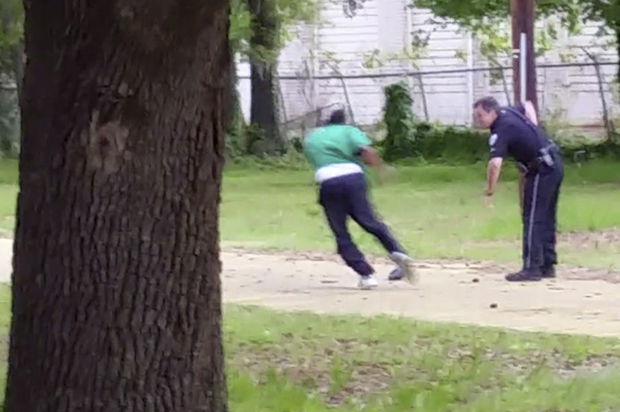We almost never saw the Walter Scott video. Feidin Santana, who recorded the April 4 shooting of Scott on his cellphone, nearly deleted the recording out of fear for his own safety. Santana had good reason to be scared – police officers across the United States have been known to retaliate against those who film them, using methods that range from blocking cameras and erasing recordings, to physical intimidation, violence and arrests for interference. Such conduct by police officers is often in violation of established police procedures and constitutional rules regarding police conduct. But it persists nonetheless. In Washington, D.C, for example, an officer arrested someone for filming just one day after his police department issued a formal – and well-publicized – regulation regarding the filming of the police.
Although politicians across the country – from North Charleston Mayor Keith Summey to NYC Mayor Bill DeBlasio – have reacted to the shooting of Walter Scott by calling for more police-worn body cameras, such calls for reform pass over the important issue of protecting civilian recording of the police. Filming of the police by civilians serves a different purpose than police-worn cameras. Cellphone footage, shot from the point of view of the civilian spectator, remains in control of the people rather than the police. Videos can immediately become part of the public discussion, an antidote to the monopoly that police officers usually possess over official narratives surrounding police-citizen interactions. Moreover, when filming is done by organized groups, often called Copwatching, recording of the police becomes a form of power-building that gives purpose and momentum to movements for change.
The California state Senate should therefore be applauded for passing a bill this week, SB-411, that would explicitly exclude making audio or video recording in public as a reason to make an arrest for interfering with or obstructing the work of an officer. State legislatures across the country should be similarly proactive in crafting state criminal statutes to clarify that recording police is not a crime. Unfortunately, however, political support for protecting the civilian right to record is far less common than calls from politicians for police-worn body cameras. Indeed, in Texas, a state lawmaker recently introduced a bill that would criminalize the filming of police officers within 25 feet unless the individual filming is a member of an official news organization. After promoting his own legislation for weeks, state Rep. Jason Villalba of Dallas only withdrew his support of the bill last week in the wake of the publicity surrounding the Walter Scott shooting. We should not have to wait for another tragic incident caught on camera to start taking measures to promote respect for the rights of individuals to film the police.
Federal, local and state governments can and should do much more to make filming the police a safer enterprise. Courts must recognize a First Amendment right to film police officers. Such a right would mean that it is unconstitutional for police officers to order civilians to stop recording, confiscate cameras or place individuals under arrest merely for filming police activity. A number of federal circuit courts around the country have found such a First Amendment right to record the police, but in many federal jurisdictions courts have yet to clearly articulate this right. Indeed, a federal district court in Connecticut held this year that there is not yet a “clearly established” First Amendment right to record police activity in public. Courts throughout the country should recognize this constitutional right to record the police from a respectful distance; doing so comports with decades of Supreme Court jurisprudence that emphasize the importance of protecting public information gathering and dissemination.
But the First Amendment cannot do all of the work for us. The federal government, in particular the Department of Justice, is well-suited to take the lead on encouraging police departments to implement such changes. However, although the DOJ issued a letter in 2012 stating that civilians have a right to record the police, overall the federal government has placed little emphasis on the importance of enforcing that right. Only three of 28 federal settlements, consent decrees and memoranda of agreement signed between the Department of Justice and local police departments in the last two decades include provisions relating to the First Amendment right to observe and/or record in public. And in the 115-page report released this March by the President’s Task Force on 21st Century Policing, not once does the Task Force mention the importance of bystander recordings of the police or the need for officers to be trained to respect the filming of police by members of the public.
Police-worn body cameras should be everywhere. They are useful devices to deter misconduct and document everyday police activities. But police-worn cameras are no substitute for the ability of neighborhood residents to take out their cellphones and film their public servants at work on public streets and roads. Hopefully the California state Senate’s passage of SB-411 is only the beginning of a turn toward protecting the civilian right to record.
Jocelyn Simonson is an acting assistant professor at NYU School of Law and the author of the article “Copwatching,” forthcoming in the California Law Review in 2016. Follow her on Twitter @j_simonson

